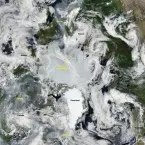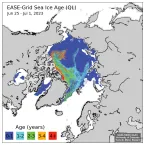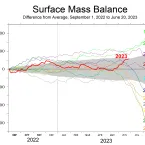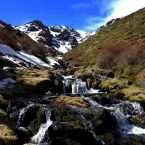Our Research
As climate changes, how do Earth's frozen areas affect our planet and impact society?
In this section
Related News & Stories
Filter by:

Analysis - Sea Ice Today
Arctic sea ice continues to decline at a near-average pace, with ice extent twelfth lowest in the satellite record at this time.

Analysis - Sea Ice Today
The longest day of summer has come and gone, and summer melt is in full swing, with the pace of ice loss overall about average for this time of year. Arctic sea ice extent for June was not exceptionally low compared to other recent years.

Feature Story
In July 1879, the USS Jeannette left port in San Francisco en route to the North Pole. What lay at the top of the world was still shrouded in mystery. Was it a warm inland sea, a sheet of ice, or open ocean? The crew set out to find out. The majority of the crew of the USS Jeannette perished during the journey, but their memory lives on through the invaluable scientific information that they laboriously collected and returned to civilization.

Analysis - Ice Sheets Today
The melt season for the Greenland Ice Sheet has been near-average so far, with cool conditions in northern Greenland despite warm weather in nearby Arctic Canada. A small region of the ice sheet may not be properly mapped as it shows a higher number of melt days than is likely considering the observed weather for that area.

Spotlight
In March 2023, NSIDC's Alan Bourgeois and Jesslyn Di Fiori headed to Fairbanks, Alaska, for the NASA SnowEx 2023 field campaign, or as they described it, “a crash course in snow science.” Their participation in this campaign provided a unique experience to participate in the creation of data.

Analysis - Snow Today
Despite a record-breaking snowpack this winter, in May 2023 snow-covered area for the western United States was only 106 precent of average, ranking eighth in the 23-year-satellite record.